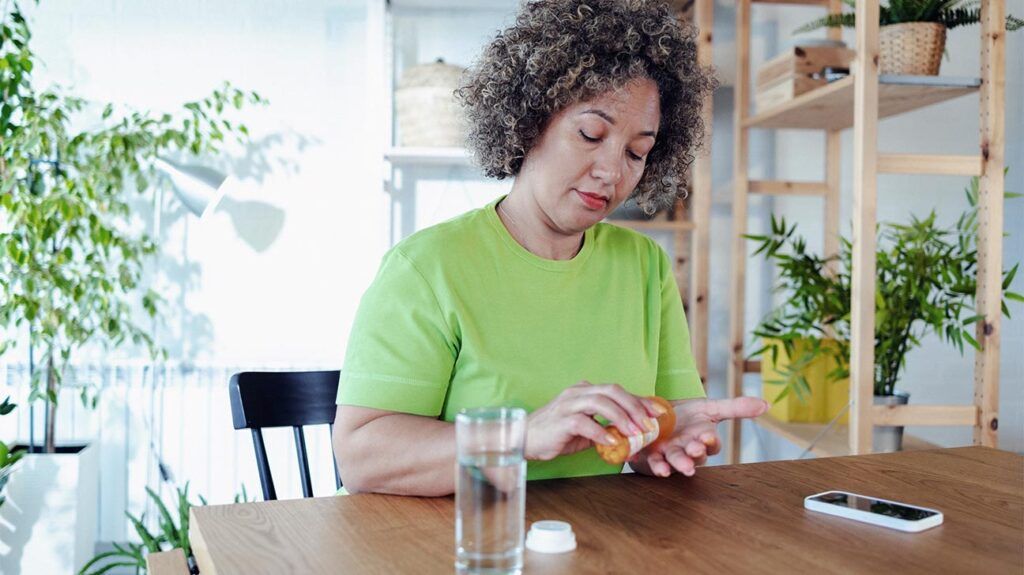Certain supplements, such as probiotics, vitamin D, and calcium, may provide some relief of menopausal symptoms. However, they may not work well for everyone.
Supplements contain one or more minerals, vitamins, botanical products, herbs, or other substances that may benefit the body. They typically come in capsule, pill, and liquid forms.
Many people take supplements to help manage various symptoms associated with menopause. Before starting a supplement, a person should discuss it with a healthcare professional since some supplements can interact with medications.
The following list provides information on several supplements that may help reduce symptoms relating to menopause.

Probiotics provide beneficial bacteria and other microorganisms to the gut. These microorganisms play a role in a person’s overall health across several systems of the body.
The authors of a
According to the review, the benefits of the microbiota may include:
- aiding calcium absorption as a preventive measure against osteoporosis
- helping to manage cardiometabolic risk factors such as obesity, high blood sugar levels, and inflammation
- reducing the risk of breast cancer and type 1 endometrial hyperplasia (a precancerous condition)
- preventing or treating oral conditions such as menopausal periodontitis (gum infection) and gum inflammation
However, the authors note that more research is necessary to explore probiotics as a treatment for menopause.
The results of a small
Probiotics come in a variety of formulas. A person should consult a healthcare professional to find out which one may work best for them.
Black cohosh is a plant native to North America. People have used it for years to help with various menstrual symptoms and other conditions.
Currently, people use black cohosh to help manage menopausal symptoms
- night sweats
- hot flashes
- sleep disturbances
- vaginal dryness
- irritability
- heart palpitations
- tinnitus (ringing in the ears)
- vertigo
- nervousness
Available research on the use of black cohosh is older and has had mixed results.
In a
Flaxseed is a good source of omega-3 fatty acids, alpha-linolenic acid, and fiber.
In an older
However, flaxseed may not be effective or appropriate supplement for everyone. More research is needed on its effects on menopause symptoms.
Red clover
Some
Some people take calcium supplements to help manage menopausal symptoms.
While calcium may help with bone loss or other health concerns, an
Still, according to the
- Ages 19–50 years: 1,000 milligrams (mg) daily
- Ages 51 years and older: 1,200 mg daily
This helps protect against bone loss, which is common after menopause.
According to a
- cardiovascular disease
- diabetes
- musculoskeletal issues
The authors mention that adding vitamin D supplements may provide a safe and effective treatment for several menopausal symptoms. They recommend further studies to confirm their suggestions.
Traditional Chinese medicine practitioners have long used wild yam as a remedy for some symptoms, including those relating to menopause.
However, in a 2019 review of complementary therapies, researchers noted that current evidence is inconsistent and does not fully support the use of wild yam for menopausal symptoms. They state that additional studies are necessary to determine the safety and effectiveness of the supplement.
Evidence suggests that St. John’s wort (Hypericum perforatum) may help with menopausal symptoms.
In a small 2019 study involving 70 people, researchers found that the group who took 270–330 micrograms of H. perforatum three times per day for 3 months showed improvement in symptoms, including hot flashes and depression.
They also noted that the number of people without depression increased from 5.4% to 80% during the study.
Dehydroepiandrosterone (DHEA) is a hormone that occurs naturally in the body and plays several roles.
In a
- increasing muscle mass
- helping maintain the immune system
- reducing hot flashes
- helping reduce bone loss
However, they noted that the quality of studies so far is generally lacking. They recommend further studies to determine the efficiency and safety of DHEA use for menopausal symptoms.
According to a 2019 review of complementary therapies, practitioners of traditional Chinese medicine have used dong quai along with other herbs to support female reproductive health. The authors noted that previous studies had showed promise for its use in menopause.
However, they raised concerns about the need to combine dong quai with other herbs for effectiveness, as well as about possible side effects such as medication interactions and increased light sensitivity.
Some evidence suggests that soy supplements may help with menopausal symptoms.
In a
The authors of a 2022 systematic review concluded that sufficient evidence supports the use of ginseng supplements for menopausal symptoms. They found strong evidence that ginseng significantly reduces hot flashes and other menopausal symptoms.
The results also suggest that ginseng supplements may improve people’s overall quality of life.
Menopause resources
Visit our dedicated hub for more research-backed information and in-depth resources on menopause.
Supplements such as calcium, vitamin D, ginseng, and probiotics may help reduce menopausal symptoms in some people. However, more research is necessary to confirm the effectiveness of many supplements for this purpose.
Before starting a new supplement, a person should discuss it with a healthcare professional to ensure that it is safe for them.
